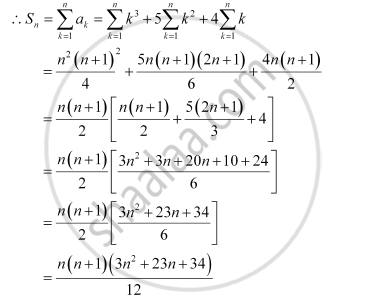Advertisements
Advertisements
प्रश्न
Find the sum to n terms of the series whose nth term is given by n (n + 1) (n + 4).
उत्तर
an = n (n + 1) (n + 4) = n(n2 + 5n + 4) = n3 + 5n2 + 4n

APPEARS IN
संबंधित प्रश्न
Find the sum to n terms of the series 1 × 2 + 2 × 3 + 3 × 4 + 4 × 5 + …
Find the sum to n terms of the series 1 × 2 × 3 + 2 × 3 × 4 + 3 × 4 × 5 + …
Find the sum to n terms of the series 3 × 12 + 5 × 22 + 7 × 32 + …
Find the sum to n terms of the series 12 + (12 + 22) + (12 + 22 + 32) + …
Find the sum to n terms of the series whose nth terms is given by n2 + 2n
Find the sum to n terms of the series whose nth terms is given by (2n – 1)2
Show that `(1xx2^2 + 2xx3^2 + ...+nxx(n+1)^2)/(1^2 xx 2 + 2^2 xx3 + ... + n^2xx (n+1))` = `(3n + 5)/(3n + 1)`
13 + 33 + 53 + 73 + ...
22 + 42 + 62 + 82 + ...
1 × 2 + 2 × 3 + 3 × 4 + 4 × 5 + ...
Find the sum of the series whose nth term is:
2n2 − 3n + 5
Find the sum of the series whose nth term is:
(2n − 1)2
Write the sum of the series 2 + 4 + 6 + 8 + ... + 2n.
3 + 7 + 14 + 24 + 37 + ...
2 + 4 + 7 + 11 + 16 + ...
\[\frac{1}{1 . 4} + \frac{1}{4 . 7} + \frac{1}{7 . 10} + . . .\]
\[\frac{1}{1 . 6} + \frac{1}{6 . 11} + \frac{1}{11 . 14} + \frac{1}{14 . 19} + . . . + \frac{1}{(5n - 4) (5n + 1)}\]
If ∑ n = 210, then ∑ n2 =
If Sn = \[\sum^n_{r = 1} \frac{1 + 2 + 2^2 + . . . \text { Sum to r terms }}{2^r}\], then Sn is equal to
Write the 50th term of the series 2 + 3 + 6 + 11 + 18 + ...
The sum of the series
\[\frac{1}{\log_2 4} + \frac{1}{\log_4 4} + \frac{1}{\log_8 4} + . . . . + \frac{1}{\log_2^n 4}\] is
If \[1 + \frac{1 + 2}{2} + \frac{1 + 2 + 3}{3} + . . . .\] to n terms is S, then S is equal to
Sum of n terms of the series \[\sqrt{2} + \sqrt{8} + \sqrt{18} + \sqrt{32} +\] ....... is
The sum of the series 12 + 32 + 52 + ... to n terms is
Write the sum to n terms of a series whose rth term is r + 2r.
If the sum of first n even natural numbers is equal to k times the sum of first n odd natural numbers, then write the value of k.
3 + 5 + 9 + 15 + 23 + ...
Find the natural number a for which ` sum_(k = 1)^n f(a + k)` = 16(2n – 1), where the function f satisfies f(x + y) = f(x) . f(y) for all natural numbers x, y and further f(1) = 2.
Let Sn denote the sum of the cubes of the first n natural numbers and sn denote the sum of the first n natural numbers. Then `sum_(r = 1)^n S_r/s_r` equals ______.
The sum of all natural numbers 'n' such that 100 < n < 200 and H.C.F. (91, n) > 1 is ______.
